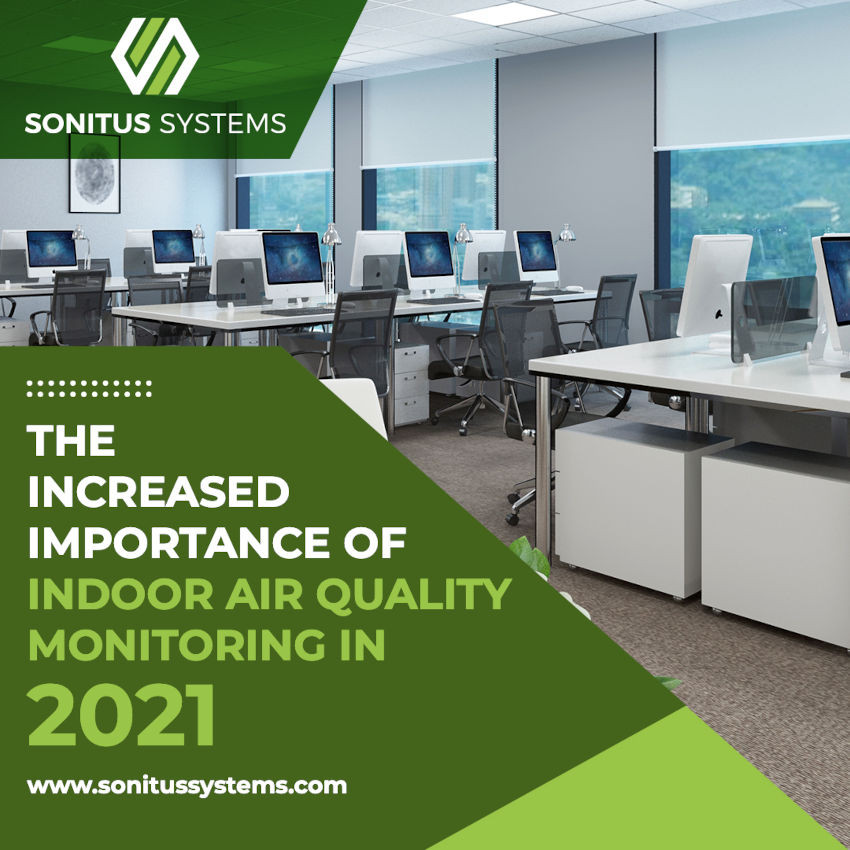There has been an increased awareness of – and emphasis on – the monitoring of indoor air quality over recent years and this awareness heightened over the past 10 months, in the context of Covid-19.
There has been an increased awareness of – and emphasis on – the monitoring of indoor air quality over recent years and this awareness heightened over the past 10 months, in the context of Covid-19.
The conversation around indoor air quality has changed substantially and this is particularly relevant in the workplace as building owners and operators struggle to make their spaces safer for employees.
We recently explored The Evolving Role of Buildings in Supporting Health & Wellbeing from both an air quality and an acoustic performance (noise control) perspective.
Prior to the outbreak of the current pandemic, indoor air quality was primarily focused on levels of carbon dioxide, volatile organic compounds (VOCs) and particulate matter (PM), and the impact of these levels on human health.
However, since 2020, the focus has rightly shifted to viral survivability, which broadens the focus to include air exchanges, humidity and even lighting. According to the World Green Building Council
in a recently published article COVID-19 Brings Indoor Air Quality Monitoring Upfront, “whilst buildings themselves cannot solve
the COVID-19 pandemic, it cannot be denied that they will play a crucial role in minimising viral transmission”. That article quotes a 2019 study (Assessing the Dynamics and Control of Droplet- and Aerosol-Transmitted Influenza
Using an Indoor Positioning System by Smieszek, T., Lazzari, G., & Salathé, M.), which boldly claims that enhancing indoor air quality could be as effective in reducing aerosol transmission of viruses as vaccinating 50 to 60 percent of the population. Interestingly, the World Green Building Council article points out that buildings are unique, therefore approaches to managing indoor transmissions should be too:
“As guidance emerges from a variety of sources, often making blanket statements regarding the configuration of heating, ventilation, and air-conditioning (HVAC) systems, building operators should remain cautious as to not lose sight
of the unique nature of buildings. For example, increasing outdoor ventilation might be a sound strategy for one building but could create poor temperature and humidity in another, leading to a reduction in immune system health and
an overall increase in viral transmission risk.”
As Ireland, and many countries around the world, remain firmly within the grip of the pandemic, this third – and apparently more virulent wave – has resulted in the closure of almost all non-essential workplaces.
As we await the comprehensive roll out of domestic vaccination programmes, building owners and operators need a robust plan of action, based on an expertly tailored indoor air quality or IAQ policy, to ensure the safe return of their teams over the coming months. It is not just about making buildings safer, employers have the added challenge of communicating this enhanced safety to building occupants. While pandemic-responsive solutions are
being prioritised, the operational performance of the buildings in terms of sustainability goals cannot be ignored. And it is important to note that all technology-driven solutions still require behavioural change to ensure any
risk of the virus spreading is minimised. Information and access to real-time data about key metrics of the workplace is one immediately available and realistically achievable solution. The Sonitus Cloud dashboard provides clear, easy to understand insights that will give building occupiers and their employees peace of mind.
Sonitus Systems offers both the hardware and software for a range of environmental parameters on a continual basis, with real-time information available through our Sonitus Cloud dashboard.
For more details on our indoor and outdoor noise and air quality monitoring products and services, please contact the team at www.sonitussystems.com/contact/contact.html
